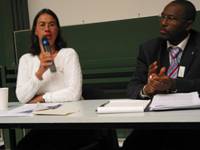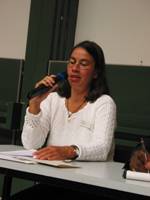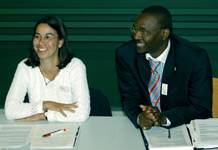

The main task of the National Committees is to spread the ideas of UNIFEM, of women in the developing countries and we do it in Germany by giving an annual award, the so call The German UNIFEM Award, and this year we have the topic “Women and Renewable energies in developing countries”; so this is the reason why I am here.
Within the UN system UNIFEM and UNDP work very closely together because UNIFEM is a very small organisation with voluntary contributions from the state and governments and private and individual donors and UNDP is a much bigger organisation and it is working to improve human development.
The aims of UNIFEM could be classified into three main categories:
So UNDP has offices in very different regions especially in Africa and Asia. And the main approach of UNDP is to help promote the millennium development goals. The most important is to reduce poverty. In this field of reducing poverty, the access to affordable energy has a very big motion now.
Second is to combine this with gender qualities; this means that women use solar-cookers but they are seen as those using the energy but they are not always the ones producing or designing the energy or making policies or which forms of energy they need.
So this is a special focus how UNIFEM and UNDP are coming together. They want to see how the need of women could be properly addressed in the policies.
Energy or renewable energy is UNDP’s new topic. This morning we heard a lot about NGO activities and all what has been said is really true. The topic of renewable energy is new in the UN system. Until now these energy forms has not been seriously considered when dealing with energy issues.
What is interesting concerning the programs is, when we are talking about renewable energies, in most countries there are a lot of programs, in which are well confined a mix of different sources of renewable energy. As we heard before biomass is very important for the women in Africa. And the use of sun is very important for people in Africa.
We have different programs like biomass and wind energy. What we don’t have is solar-energy. But in some cases the people complain of the high costs of solar utensils.
The women, especially in the rural areas, need lot of energy in the households e.g. for cooking, sanitation, lighting, grain-grinding etc. These are activities that are time consuming and demand lot of manpower to do. By resolving their energy demands they will have time to do other things which could be income generating.
From 1999 to 2002 a research program was launched on the energy demands of women in Africa. Regional conferences were organised to define and specify these demands in detail through the participation of women themselves. Participants were energy experts and representatives of NGOs and governments.
The aim was how to get access to energy for domestic and production purposes. The women were willing to be involved in solving the problems. First of all there is no energy - therefore how to get it.
Some of them express frustration about energy projects, e.g. improved cook-stoves, solar-cookers and food-dryers and etc. These were donor giving energy projects without making consultations with the expected users, the women in this case.
When the funding ceased, the equipments were of no use to the people anymore. Some women also complained that some of this projects were very much limited and therefore they could not be properly schooled to deal with the new technology.
They said what they need are nationwide projects which are long termed.
After the consultations and regional conferences were over, we started different projects according to the ideas and demands of the women in the different counties. And interestingly biomass has been high on the list. I will give examples of two cases of women projects concerning renewable energy.
The first project is Uganda. Here we started with Solar Home Systems within the context of rural electrification. This is how we start to promote this technology in Uganda.
We had about three problems
As the project was specially focused in the rural areas, it was necessary that women took up the promotion and distribution of the systems and not just be users. Something that was also income generating. Banks and special banking system has been established to enable the women to get and pay their credits and also to make savings.
This project however is very necessary because up to now only 5% of Uganda’s population have access to electricity. Some reasoning what we heard here today that electricity is luxury gut because it is so expensive and this is totally opposite to that what the people of Uganda think.
They are very much convinced that electricity will improve their living standard and are prepared to work hard to possess it. They want their children to learn in the night and they want to do many other things in the night, which they couldn’t do without electricity or light.
This project was aimed at communities and individuals who design their own method of distributing and communicating it and it came out that a lot of these companies and marketing groups were comprising of only one man and a woman, though they were focusing specially on women.
So it came out that women were viewed primarily as users and not as manufacturers or distributors of the solar equipments. It was also later proven that they need a special battery in combination with the system that is very expensive. So this affected the marketing of these products.

After three years the project was evaluated. The high prices made it unaffordable for most of the women from poor households who were the main focus. Then a suggestion was made to reduce the size or capacity of the panels so that most people could be able to afford it. But the solar rechargeable batteries also are too expensive. So the evaluation report concluded that the project failed to involve a lot of women because the systems are too expensive for the majority.
The second example is about food processing in Ghana.
This was a project designed by UNIFEM and UNDP. UNIFEM as I said focuses mainly on economic security and economic right for women. So if you use energy no matter what energy form, it must be economical so that women can be able to make profit in their income generating projects.
As a lot of women in West Africa are involved in agriculture and in small and medium scale food processing, the women in this regional group said that they would like to do something in this field which is income generating. So they took the initiative to improve the processing of shea butter, something that already is a very good income generating product.
But the process is time consuming and demands lot of fuel, which leads to deforestation. For these reasons they need another technology. And so the research and technological institutions were researching on energy saving technology.
Shea butter is really a very good income generating activity and this is well known in Northern Ghana. And it is used not only in Ghana but also in other West African countries, especially in the fields of cosmetics and chocolate production, which is also good for the external market.
The women were the shea butter producers but they wanted a better technology that would help them to increase the output and reduce the fuel used for production.
They also wanted better access to the market to increase their income, meaning they want to eliminate the middleman. So the focus was on introducing and testing a new press that would reduce the fuel and water used.
And to eliminate the middleman the project promotes an effective marketing system for the women products and is making efforts to link the women directly with international markets through collaboration with shea butter processors in Burkina Faso.
The project was started in 2000. It is functioning and we could say it is success. UNIFEM also thought to prolong it and even to extend it. Another income generating project is fish smoking in Accra area.
Female members of a family do fish smoking and men do fishing. The smoked fish is partly for own consumption and part is sold on the local market. Long time ago fish smokers were depending on traditional firewood techniques. So this form as well as solar refrigerators are used to conserve fish. But not all types of fish could be conserved with these methods.
In other to save energy, they also use a special smoker. This project was also very successful and the women could earn good and they could also sell some special fish which are very famous locally and also on the big market.
The women have to pay in instalment for the smoker, which was paid for after about two years.
With these two examples one can see how specially renewable energy is linked with the needs of women, especially in the UN system.
What is new in the process is to involve women in the decision making and trying to use many different resources of renewable energies.
In the UNDP projects there is no special focus on solar systems and there is no special focus now on solar-cookers. These are two important points to note.
I want to close with these two examples and come back to German UNIFEM.
As I told you we have this German UNIFEM Aword and this year we found out that there were not too many applications for this field women and renewable energy in the developing world. And most projects, which come in were about solar-cookers.
So this is the topic we had today and yesterday and in fact that is the topic of this conference. What is remarkable is that most of these projects are about Africa. So this seems to be a topic for small groups and NGOs as to how they want to use solar energy. And this is interesting because in November we have our big celebration and we have to see who will be the winner of the prise “women and renewable energy”.

Thank you.
Jeannette Spenlen: Let me make it clear, the German National Committee is not involved in making projects. We just support the idea of projects. And I also asked the officers of UNIFEM as to why they don’t get involved in the area of renewable energies specially solar-cookers and they said they have very small fund.
They really have three tasks and this main area is “women economy rights and security”. So if it is possible to earn gut with solar-cookers, I mean when it could really income generating, then there will be no problem in engaging this fund in this area. It is not because they have something against solar-cookers. No, that is not it. But it has to be income generating. Cooking alone is not enough for UNIFEM.
Chairman: I suggest that we first get the questions and the answers will follow.
Jeannette Spenlen: Thank you very much for those excellent comments and I will try to answer all the questions.
Anyway I may have to apologize because the dateline for submitting applications has passed. July was the dateline. But we have another one next year about “how to use land and forest”. So to say best farm and foresting practice. Who wish to have more information could give me his address and I will send this to you.
So whether UNIFEM is involve in Congo and surrounding countries? Yes, we are in Congo, Burundi and Rwanda. Yes, our first target is “Women economic rights and security” and our second is “political stability” and “peace building and leadership of women”.
So Congo, Burundi, Rwanda and Afghanistan are the major areas of UNIFEM at the moment. But peace building is a difficult process and it is nowadays very dangerous. We are trying our best anyhow by bringing women together to peace table.
About the comments of Mrs Pretorius, I would say we share the same opinion. Until now there has been lot of competition in this field also like all the others. This is of course contradictory but it is all about the good name of ones organisation.
This could be changing now, because people tend to work in teams and networks. If it would be possible for the donors of these NGOs to work together, it will be great. But is also a major problem. The donors compete each other and this is what is affecting the NGOs on the field. I totally support the idea of training people to service the equipments.
Thank you.
Paul Krämer: To your question whether life is complicated with the different forms of renewable energy method, equipment and usage: I don’t see it this way and most African families don’t see it this way either.
Let us take Chad as an example. People in N’djamena for instance use different energy sources for different purposes. They use charcoal, wood, Kerosene and gas and each for something different. So these are the four forms of energy they use. I think life has been complicated but the choices have been enlarged. And this is big gain.
Let me add another important thing. Women in African countries are suffering from fumes if cooking is done inside. And it is estimated that about two million additional deaths of especially women and children are attributable to these cooking fumes. And about 4% of global burden of disease are due to this same cause.
The global burden of disease is a notion, which involves the severity and the duration of disease, and the financial consequences to the family.
Thank you.
Bernd Hafner: I just want to make a comment.
I want to start by defining the solar-cookers. I have two samples of solar-cookers. One we said you can put your food inside and turn to other things and the other you have to look after your food, when cooking.
Now we take for granted that you want to travel. The decision is yours how and with which means you want to make you journey; whether you go by foot, train, car or whatever.
In the case of solar-cookers too, you have the choice to make between different cookers.